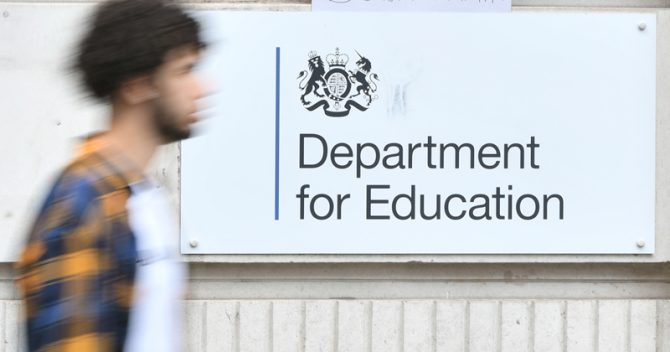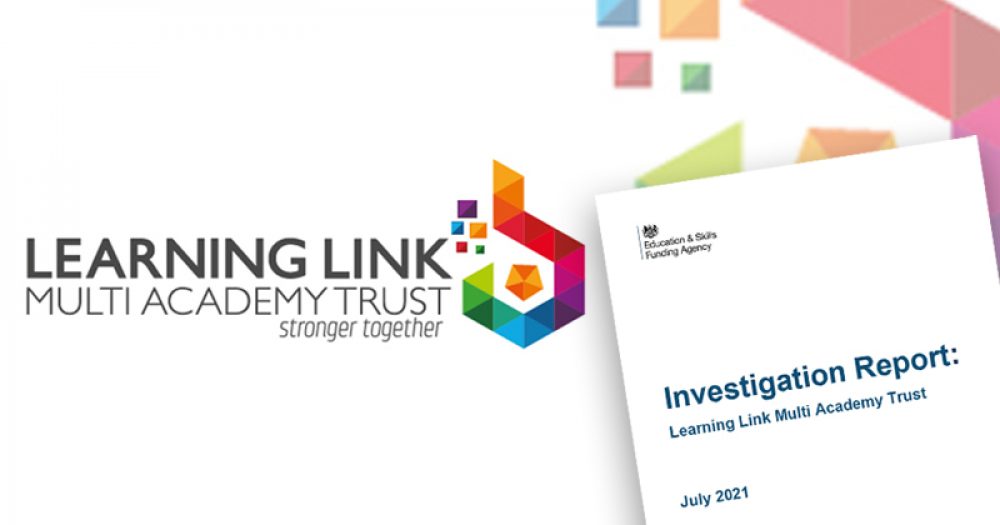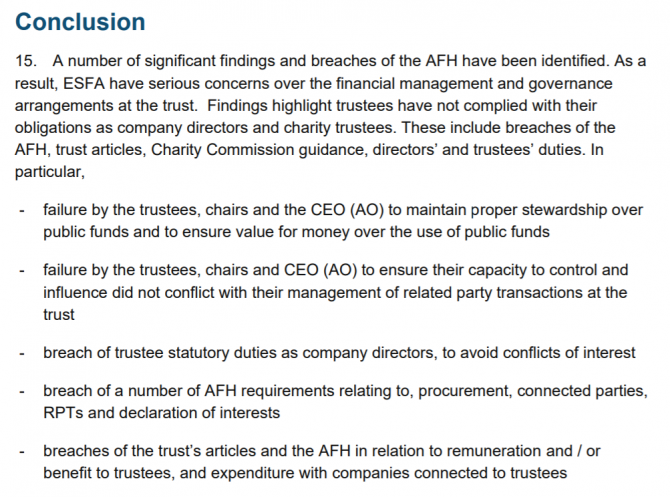An academy trust breached funding rules after handing its chief executive “significant” extra benefits without board approval – including a £38,000 car allowance, despite “no evidence a car had been leased”, and a £3,000-a-year healthcare package.
The Education and Skills Funding Agency published an investigation report into the Learning Link Multi Academy Trust on Friday. The trust was issued with a financial notice to improve last January and is to be stripped of its four academies before it closes down.
The ESFA said it received allegations in July 2019 “centred around a lack of financial management, related party transactions and payments made to the chief executive officer”.
The ESFA considers the £38,250 car allowance paid to the CEO as wholly irregular and a misuse of ESFA funding
Visiting the trust in late 2019, the ESFA found “significant failings and weaknesses in financial management and governance” that breached academy rules. The trust had a cumulative deficit of £394,082 at the end of 2018-19.
£38k CEO car payments to ‘misuse of public fundings’
Investigators found former CEO Paul Harrison’s salary and working hours were increased from 2.5 days to four and then five without formal board approval.
While receiving a salary for four days a week, Harrison’s company received payment for an “additional day of consultancy”, which was also not formally approved by the board.
In November 2018, the trust entered into an “enhanced contract” with the CEO, providing “significant additional benefits” including a leased car costing up to £11,400 a year, plus £5,000 lease deposit and £3,000 annual healthcare package.
These enhanced benefits were “backdated to start from March 2018″, and the car leasing allowance – which totalled £38,250 – was paid “despite no evidence that a car had been leased”.
The ESFA said this was a “wholly irregular and a misuse of ESFA funding”.
There was “inadequate independent board oversight” over these enhanced contract arrangements, and the CEO was “involved in the process to set up his own contract and terms”.
There was “no evidence that the trust or the CEO considered the appropriateness of this”.
Questions over letter claiming to be from trust chair
The ESFA found that Harrison had emailed solicitors with a draft of the enhanced contract in November 2018, along with a letter purporting to be from then chair Grenville Earney “writing to the CEO on behalf of the trustees to offer him the role of CEO effective from 1 March 2017”.
The letter was dated February 17, 2017. However, Earney did not become chair until September 2018, 19 months later, and told the ESFA he was not aware of the letter.
The CEO “should have considered the accuracy of the document he was providing, and his conflict of interest”, the ESFA said.

During interview, Earney claimed he had signed the new contract without reading it properly and was unaware of the term relating to the car leasing and health insurance allowances.
But the ESFA said June 2019 minutes with a subset of trustees “record the chair confirming he is aware these additional benefits are included within the CEO contract”, and “also record the chair discussing these benefits in detail and how they can be delivered”.
The report found the chair “failed to exercise reasonable care, skill, diligence and independent judgement in dealing with the CEO enhanced contract”.
£292k spent contracting senior staff with ‘no formal procurement’
The investigation reviewed a sample of contractors providing the “services of senior staff” at the trust, and identified £292,989 of expenditure with “no evidence of any formal procurement or tendering conducted”.
These transactions “breached the trust’s financial regulations and multiple aspects of the AFH (including off payroll provisions) and are deemed contentious and improper”.
The contractors were engaged to fill trust senior staff positions and were paid off-payroll, and roles covered included the chief operating officer and school improvements officer, as well as two chief financial officers.
The trust paid £27,420 to Up4Success Ltd and £120,450 to AVT Associates Ltd. The sole director of both companies was Claire Thompson, Learning Link’s acting CEO from January 2020 to January 2021, and the trust’s former contracted school improvement officer.
Over £100k in related-party transactions
From 2017, the trust also bought services potentially totalling £100,467 from five companies “classed as related parties”.
The ESFA found breaches of the financial handbook and financial regulations in these transactions, including no evidence of procurement, inadequate board oversight or approval, and “no evidence of the management of conflicts of interest”.
At least £15,600 of these payments “should have obtained ESFA prior approval given their novel and contentious nature”.
The trust submitted a related-party declaration to the ESFA in October 2019 confirming “certain conflicts” had been managed and compliance with the AFH at-cost policy. But the findings of the investigation “confirm the declaration was inaccurate”.
The investigation found payments of £14,040 to iED (UK) Limited, a management consultancy of which both Harrison and his wife were directors at the time. The trust also paid £15,600 to iED Care, deemed to be the “same legal entity” as iED (UK).
The trust was “unable to provide a clear evidence trail of all expenditure” with both companies
Officials also found invoices for £14,400 to API Innovation Ltd, which is registered as providing “information technology consultancy activities”, and at the time counted Harrison as one of its directors.
The trust “could not evidence a contract” with the company that was in place when the delivery of services started, and “no formal procurement exercise was evidenced”, the ESFA said.
New trust board ‘committed to positive future for schools’
The report concluded that trustees, chairs and the CEO had failed to maintain “proper stewardship over public funds” and ensure value for money. They had also failed to ensure their capacity to control and influence “did not conflict with their management of related party transactions at the trust”.
The ESFA also found trustees breached their statutory duties as company directors to avoid conflicts of interest.
Harrison was approached for comment via the Link trust. A Link trust spokesperson said they “recognise the issues raised and acknowledge that the trust has had a challenging time in the past.
“We have an entirely new board of trustees, which is committed to continuing to work with the regional schools commissioner to transfer the four academies to new trusts, providing a more positive future for each of them.”









It is truly astonishing and disgusting that money that is supposed to meet the children’s needs, taxpayer money is being used in this way to feather the beds of those at the top of this trust. Until the government make it a priority to name and shame these “trusts” then penalise them this will only get worse leading to cronyism, arguably already prevalent in education and fraud. Instead hey want to expand this perhaps so some of their mates can get in on the potential windfall?
Quite agree.
How do these school ‘leaders’ address their student populations in school assemblies etc. when talking about morals?
When all state schools were within a local authority there was some corruption but compared to what we have today it was minuscule.